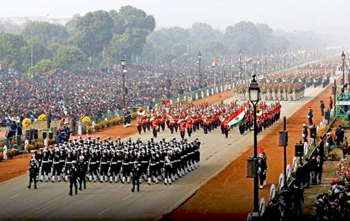
New Delhi, Jan 26: United States president Barack Obama on Monday will witness the country's military might and its diverse cultural and social traditions as the chief guest at the 66th Republic Day parade to be held at central Delhi's Rajpath.
Over 1,000 NSG snipers along with 44,000 security personnel from Delhi Police and paramilitary forces will keep an eagle's eye over the Republic Day celebrations.
The NSG snipers will maintain a hawk-eye vigil from high-rises within a two-km radius of Rajpath, from where the US president along with President Pranab Mukherjee and Prime Minister Narendra Modi will witness the Republic Day parade.
The highlights of this year’s Parade will be the display of indigenously developed surface-to-air Akash medium range missile (army version) and Weapon Locating Radar both developed by the DRDO.
The recently acquired long range maritime surveillance and anti-submarine aircraft P-8I and the deadly long range advanced air fighter MiG-29 K will be seen for the first time. This year’s parade will also witness for the first time three all women marching contingents of the Army, Navy and the Air Force signifying women’s powerful role in the realm of defence.
The parade will be commanded by Lt. General Subroto Mitra, General Officer Commanding, Delhi Area. Major General Abhay Krishna, Chief of Staff, Delhi Area will be the parade Second-in-Command.
The parade ceremony will commence at the Amar Jawan Jyoti at India Gate where the prime minister Narendra Modi will lead the country in paying homage to the martyrs by laying a wreath.
An eternal flame burns at the Amar Jawan Jyoti to commemorate the indomitable courage of our Armed Forces personnel who have made the supreme sacrifice in the service of the motherland. The Amar Jawan, the immortal soldier, is symbolised by a reversed rifle standing on its barrel and crested by a soldier’s helmet.
The grand finale of the parade will be a spectacular flypast by the IAF. The flypast will commence with ‘Chakra’ formation, comprising three Mi-35 helicopters in ‘Vic’ formation, followed by the “Hercules” formation comprising three C-130J Super Hercules aircraft. Trailing them will be a ‘Poseidon’ formation comprising one P-8I aircraft flanked by two MiG-29 Ks and the “Globe” formation comprising one C-17 Globemaster flanked by two Su-30s.
This will be followed by the fighters, where five Jaguars will fly in Arrowhead formation, another five Mig-29 Air Superiority Fighters called the “Tridents” will fly in Fulcrum style. Then the Trishul formation comprising three Su-30 MkI of No. 2 Squadron would fly over the Rajpath, and once in front of the saluting dais, the Su-30 MkI aircraft will split upwards, making a Trishul in the sky. The flypast will conclude with another Su-30 MkI carrying out a “Vertical Charlie” manoeuvre over the saluting dais.
The ceremony will culminate with the National Anthem and release of balloons.





Comments
Add new comment